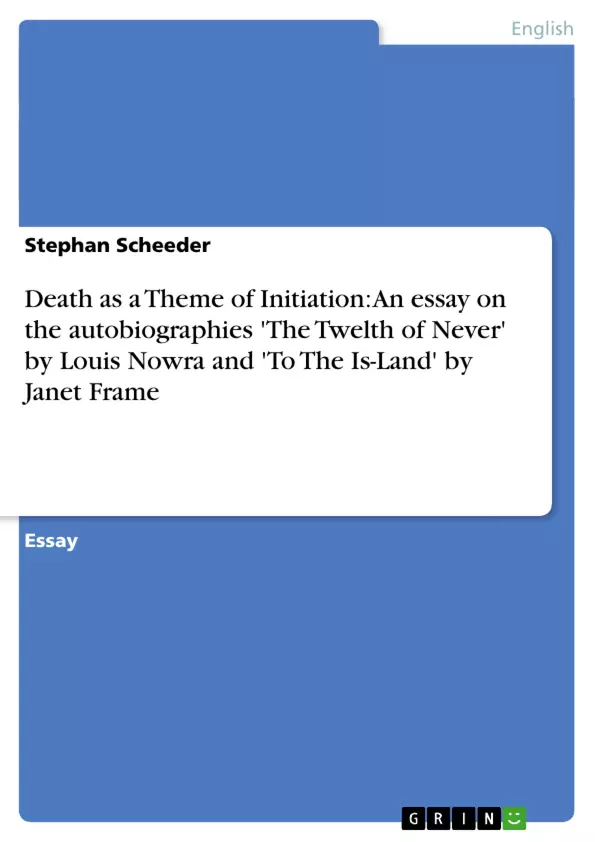In almost any story of childhood and adolescence the topic of death plays a major
role. Especially in autobiographies that begin with early childhood, death is usually
addressed at some point within the story and can often be seen as central to the
child’s initiation process. It is in a child’s first confrontations with death that it
learns about loss and sorrow and begins to understand the finiteness of life.
However, experiences with death tend to be very different for each individual child
and each child has different ways of addressing death, and coming to terms with it.
This essay will examine death as an experience of initiation in the autobiographies
To the Is-Land by Janet Frame and The Twelfth of Never by Louis Nowra. Looking
closely at both of the authors’ early confrontations with death the essay will then
seek to examine common themes of death (e.g. the power of death, the mystery of
death) and will then look at the different ways that death becomes significant to
both characters individually.
In To the Is-Land it is the loss of Frame’s Grandmother that first confronts young
Janet with the reality of death. However, it seems questionable whether Janet at this
point already grasps the finality of death. Her grandmother’s death seems to
provoke curiosity rather than grief. This is illustrated by the fact that Janet’s concern
is more directed towards the decision of whether to look at her dead grandmother
lying in her coffin, or not, than it is towards actually feeling sorrow at the loss of a
loved person. Her refusal to “look on the face of the dead”1 at the same time
confronts her with the connection of death and power, even if this connection is
drawn in a childlike and slightly bizarre way.
“When Myrtle came out of the room, I could see in her face the power of having looked at
the dead.”2
1 Janet Frame, To the Is-Land, p. 23
2 IBID
Inhaltsverzeichnis (Table of Contents)
- Death as a Theme of Initiation
- To the Is-Land
- The Loss of Frame's Grandmother
- The Death of Janet's Grandfather
- The Death of "Old Cat"
- Myrtle's Death
- The Twelfth of Never
Zielsetzung und Themenschwerpunkte (Objectives and Key Themes)
This essay examines death as an experience of initiation in the autobiographies To the Is-Land by Janet Frame and The Twelfth of Never by Louis Nowra. It analyzes the authors' early confrontations with death and explores common themes related to death, such as its power and mystery. The essay then examines how death becomes significant to each character individually.
- The impact of death on childhood development
- The role of death in understanding the finiteness of life
- The power and mystery associated with death
- The influence of death on individual experiences and perspectives
- The connection between death and language
Zusammenfassung der Kapitel (Chapter Summaries)
To the Is-Land
In To the Is-Land, Frame's early experiences with death are explored. The loss of her grandmother sparks curiosity rather than grief, while her grandfather's death is viewed through the lens of adult rituals and customs. The death of "Old Cat" is the first to evoke a sense of irreplaceable loss and marks a turning point in Janet's understanding of death. Myrtle's death, the most influential experience, brings with it the definite understanding of everlasting loss. This realization prompts Janet's interest in poetry as a means of expressing her grief and coping with death.
Frequently Asked Questions
How is death used as a theme of initiation in autobiographies?
Death serves as a pivotal experience where a child first understands loss, sorrow, and the finiteness of life, marking a transition in their development.
What is the significance of the grandmother's death in "To the Is-Land"?
For young Janet Frame, it provokes curiosity rather than grief, highlighting a childlike struggle with the physical reality and "power" of the dead.
How does the death of "Old Cat" affect Janet Frame?
It is the first experience to evoke a sense of irreplaceable loss, moving beyond adult rituals toward a deeper personal understanding of mortality.
What are the common themes of death explored in the essay?
The essay examines the power of death, the mystery surrounding it, and how individual children develop unique ways of coming to terms with loss.
How does Myrtle's death influence Janet's interest in poetry?
The realization of everlasting loss through her sister Myrtle's death prompts Janet to use poetry as a medium to express grief and cope with the reality of death.
Which autobiographies are compared in this study?
The essay analyzes "To the Is-Land" by Janet Frame and "The Twelfth of Never" by Louis Nowra.
- Quote paper
- Stephan Scheeder (Author), 2003, Death as a Theme of Initiation: An essay on the autobiographies 'The Twelth of Never' by Louis Nowra and 'To The Is-Land' by Janet Frame, Munich, GRIN Verlag, https://www.grin.com/document/16797



